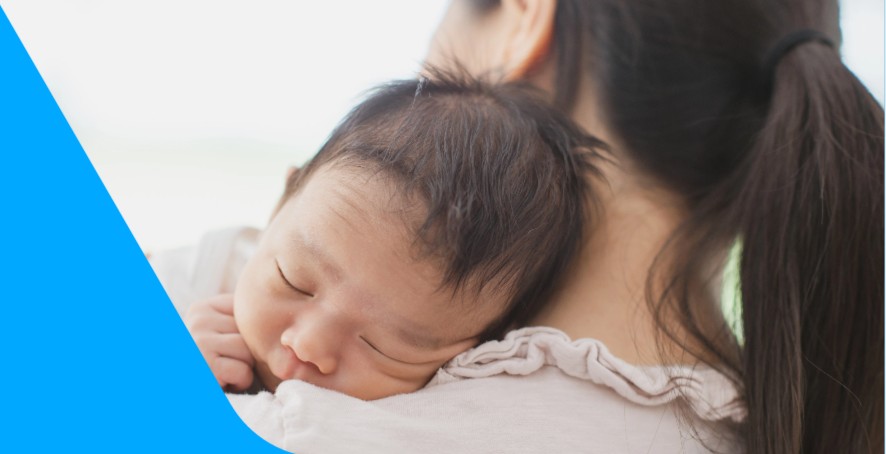SKIP TO CHAPTER

Adding a new little family member is exciting—but it can also be stressful for toddlers, who may become jealous of your new baby. Understanding what causes sibling jealousy is the first step to helping your toddler manage their feelings of jealousy about their new sibling.
We’re bringing home a New Baby—What about our Toddler?
Your second (or third, or more) baby is on the way and it’s an exciting time. All of the nesting you did the first time around is old hat, but just as fun and necessary—designing and setting up the nursery, building your maternity clothes wardrobe, and planning to bring your new baby home. But something new is on your list when getting ready to bring home your newest little bundle of joy: Preparing your toddler for their new baby sibling.
Sibling rivalry has existed as long as there have been brothers and sisters—and so has the reality that many toddlers become jealous of their new baby sibling. Understanding and preparing for this all, but inevitable event can go a long way towards easing the transition of bringing a new baby into your family.
What causes a Toddler to be jealous of a New Baby?
While the likelihood of a toddler becoming jealous of a new baby does depend in part on their personality, their stage of development, and other stressors in their day-to-day life, the biggest cause of toddler jealousy over a new baby is simply attention.
Think about it: Your little toddler love is used to receiving your undivided attention—at least when it comes to being first in your heart and mind amongst children. Even if you explain the concepts of pregnancy and siblings to your toddler, they may not fully understand either. They may begin to feel insecure; you’ll want to heap on extra love before baby arrives and continue showing them how important they are in the face of jealousy over their new sibling.
The good news is that being jealous of a new baby sibling is perfectly normal behaviour for a toddler adjusting to a new baby and it isn’t likely to affect their future relationship.
Signs your Toddler is jealous of the New Baby
Sibling jealousy can be displayed in myriad ways. Keep an eye out for these behaviours from your toddler to see if new-baby jealousy has reared its head:
-
Behaving aggressively toward the baby—poking, pinching, throwing things, and other similar behaviours'.
-
Becoming less independent, more clingy and needy
-
Throwing tantrums
-
Potty-training regression
Resist the urge to yell, scold, or punish. Yes, your toddler is acting out to get attention because they’re jealous of the attention the new baby is getting, but the negative reinforcement of punishment and harsh words are more likely to make the acting out worse.
How to ease sibling jealousy of the New Baby for your Toddler
You may not be able to avoid sibling jealousy that is developing for your toddler, but you can set them up for an easier transition from being the baby of the family to supportive big brother or sister.
Before baby arrives
Early preparation for your toddler and the household is the first step toward reducing the likelihood or length of time of toddler jealousy:
-
Be the one to tell your toddler about the new baby. A new baby is a big adjustment and a big concept—one that your little one may not be able to fully understand right away. This huge news and the facts of life—as pertains the new baby growing inside you—needs to come from you, not another family member or family friends, to avoid confusion or even resentment.
-
Have them be your little helper. There’s plenty of preparation to do around the house to make it ready for the new addition. Press your toddler into service—they’ll love to help out, they’ll feel special and important, and they’ll take pride in being a part of making home safe and comfy for baby. A tried-and-true way to boost a tiny toddler helper’s confidence and interest? Helping you push furniture around to prepare a new room.
-
Make big changes in advance. If your toddler has to switch rooms or move from a crib to a big-kid bed, make that move as soon as possible after you learn you’re expecting. This gives your toddler time to adjust to the change, reduces stress, and removes some of the risk of their internal narrative becoming “The baby took something away from me.”
-
Socialize your toddler with younger children and babies. Have your toddler get used to babies and younger kids if they’re not already. If you have a close friend or family member who just had a baby, look for opportunities for your toddler to spend time with the new bundle of joy. Explain to your child that most of the time that baby’s will eat, sleep and cry and won’t be able to be a playmate right away.
Get them excited about having more One-On-One time with your partner. While you might have to focus more on the baby, encourage your toddler and your parenting partner to spend more fun time together during Labour & Delivery
Some families choose to include their toddler in the trip to the delivery room. If this is what your family chooses, follow these steps:
-
Get them ready by sharing books about birth—your doctor or midwife can help you find resources for this.
-
Bring them to doctor appointments to help them further understand how baby is growing inside you.
-
Explain in detail, using language they understand, what the day will be like. Talk to them about what to expect in the delivery room—sights, sounds, smells—and what their new baby sibling will look like just after they come into the world.
-
Choose a caregiver to watch after them during delivery—someone they know and trust and whose only job is to watch them and keep them comfortable and comforted.
-
Let them bond with baby as soon as possible. Some families choose to let the newly minted older sibling cut the umbilical cord or put a knit hat on the baby’s head.
For families who choose to have their older child away from the delivery room, there are other ways to keep them happy and positive about the new baby:
-
Pick a caregiver your toddler knows, trusts, and has fun with and start preparing with both of them for the day you go into labour. Leave your child with this caregiver often during your pregnancy, slowly lengthening the amount of time they spend away from you and the household. Get them used to napping there, and maybe staying overnight, in case that’s a necessity the day the new baby comes.
-
Arrange for your toddler to visit you and their new sibling in the hospital as soon as possible—even before anyone else joins you and your birthing partner. Gently introduce them and let your toddler gently physically interact with baby.
-
When baby comes home, let your partner or someone else carry them through the door while you make a beeline for your little toddler love to give them hugs, kisses, and extra special attention.
After baby comes home
Rooting out sibling rivalry after you bring your baby home can be done by working the following into your new household routine:
-
Maintain as much routine consistency as possible. Of course, routines are bound to change with a new baby in the household but keep your toddler’s day-to-day the same as much as you can. This includes doing your best to not make any other new, big changes in routine for a while, like—changing daycares or caregivers, moving, and other routine-breaking things.
-
Keep them involved. Just as you involved your toddler in preparing for baby and in portions of the labour and delivery process, keep them involved in caring for the baby after they come home by giving them small tasks to do: handing you things like bottles or diapers, singing to the baby to soothe them, and other age-appropriate things.
-
Create opportunities for bonding. Let your toddler hold their new sibling (with supervision, of course), cuddle their new sibling, and give them kisses. Experts suggest that the pheromones wafting off of baby’s head (that beloved new baby smell) promotes emotional bonding and love—let your toddler get a whiff.
-
Be empathetic and share their feelings. If your toddler notes that diapers are stinky or that crying hurts their ears, echo that and agree—it’s certainly true! Don’t bad mouth baby but do help your toddler feel open to sharing their feelings. This will encourage ongoing open communication.
-
Find ways to be one-on-one. Have your partner take the lead with baby so you and your toddler can do something special together, like a trip to the park or getting a special treat together.
-
They can come first sometimes. Don’t always make your toddler wait for something they need in the name of caring for the new baby. Narrate the choice you’re making so your toddler understands that you’re addressing their need, like, “Just one moment, baby, big brother/sister needs help washing their hands.” If baby is safe and not left unattended, this is a great way to show, rather than tell, your toddler that they are still important, loved, and getting attention when they need it.
Bringing a new baby into the family is a joyous occasion, but also a stressful time. Preparing your toddler for their new sibling won’t only help ameliorate being jealous of the new baby, but it will also make for a smoother transition for everyone in the family.








